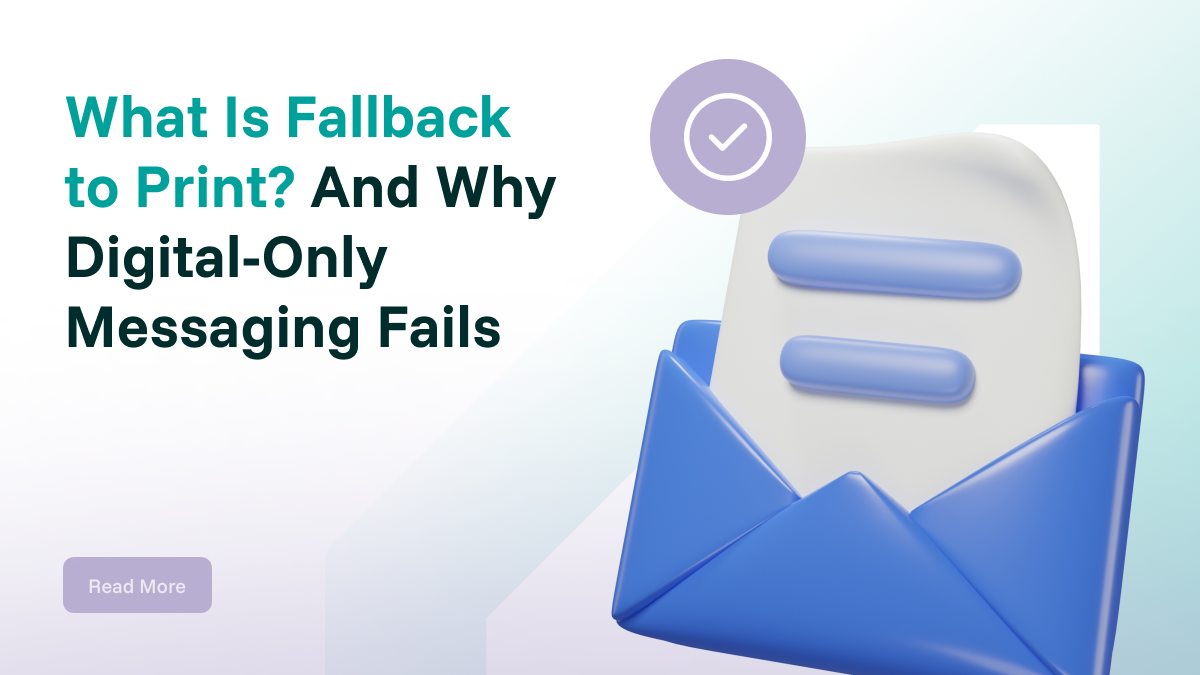.png)
How Banks and Insurers Are Future-Proofing Customer Communications in 2025
.png)
Introduction
For banks and insurers, customer communication is no longer a back-office process. It’s a compliance obligation, a trust driver, and a customer experience differentiator.
In 2025, financial services face new challenges: tighter FCA Consumer Duty expectations, shifting customer preferences, and Royal Mail reforms reducing postal frequency. The most resilient firms are moving to digital-first strategies while keeping hybrid safeguards in place.
This article explores how leading banks and insurers are future-proofing communications, balancing regulation, innovation, and customer trust.
The Regulatory Imperative
FCA Consumer Duty
From July 2023, the FCA’s Consumer Duty requires communications to be “clear, fair, and timely.” Firms must prove they are helping customers make informed decisions, with a particular focus on vulnerable groups.
Insurance Distribution Directive (IDD)
Insurers must provide policy documents in a durable medium — which often means post, unless customers have opted into digital delivery.
Why It Matters
- Fines are rising: FCA issued £215m in penalties in 2023, some linked to failures in disclosure and customer communication.
- Postal reforms add pressure: fewer Royal Mail delivery days increase the risk of SLA breaches for notices, arrears letters, and policy updates.
Compliance is no longer optional, it’s central to operational strategy.
Digital-First, But Not Digital-Only
Banks and insurers are investing heavily in digital-first channels:
- 81% of UK adults now use online banking.
- Over 64% rely on mobile banking apps.
- Insurers are shifting renewals, updates, and claims correspondence to secure portals and apps.
Yet not every customer is ready for digital-only. Around 30% of policyholders still expect paper renewal reminders.
The solution is balance: default to digital, but respect compliance and customer choice.
Hybrid Mail as the Compliance Safety Net
Hybrid mail offers the flexibility financial services need in 2025:
- Digital-first delivery via email, SMS, or secure portal.
- Automated fallback to post when digital isn’t possible or when regulation demands.
- Audit-ready logs proving timeliness and security.
- SLA protection: automation ensures regulated deadlines are met, regardless of Royal Mail reforms.
Use cases include:
- Transaction notices.
- Policy updates.
- Arrears and collections communications.
- FCA-mandated disclosures.
Sector Case Studies
Banking Example
A leading UK retail bank introduced hybrid workflows for arrears notices. Customers who opted into digital received SMS/email first. If not read within 24 hours, a letter was triggered.
Result: SLA compliance improved, customer complaints dropped, and print volumes fell by 40%.
Insurance Example
A major UK insurer shifted renewal reminders to its secure app, with hybrid print fallback for customers without digital access.
Result: Cost savings of 25% on renewal communications while maintaining FCA/IDD compliance.
Trends to Watch in 2025
- Regulatory scrutiny will increase: FCA is expected to expand enforcement under Consumer Duty.
- Automation and AI will be used to personalise communications while tracking compliance.
- Sustainability goals will drive paper reduction, making hybrid workflows a strategic ESG win.
- Audit-ready communications will become a board-level requirement, not just a compliance add-on.
FAQs on Financial Services Communications
Q: What does FCA Consumer Duty mean for banks in 2025?
It requires banks to prove that communications are timely, fair, and easy to understand.
Q: Do insurers still need to send paper policy documents?
Yes, unless a customer has opted into digital delivery, print is still required for compliance.
Q: How can hybrid mail protect against missed SLAs?
By automating digital delivery with postal fallback, ensuring communications always meet deadlines.
Q: What’s the role of audit trails in compliance?
They provide proof of when, how, and to whom communications were delivered, essential for FCA and IDD audits.
Q: Will digital-only become mandatory in financial services?
Unlikely. Regulators stress accessibility, meaning customer choice and durable mediums remain essential.
Conclusion & Next Steps
Banks and insurers face a dual challenge in 2025: delivering compliant, audit-ready communications while meeting customers’ digital expectations. Hybrid mail provides the safest path — blending digital-first efficiency with compliant fallback options.
Micom enables financial services to modernise communications, cut costs, and protect trust without compromising compliance.
Explore next steps with Micom:


.avif)

.avif)



.png)